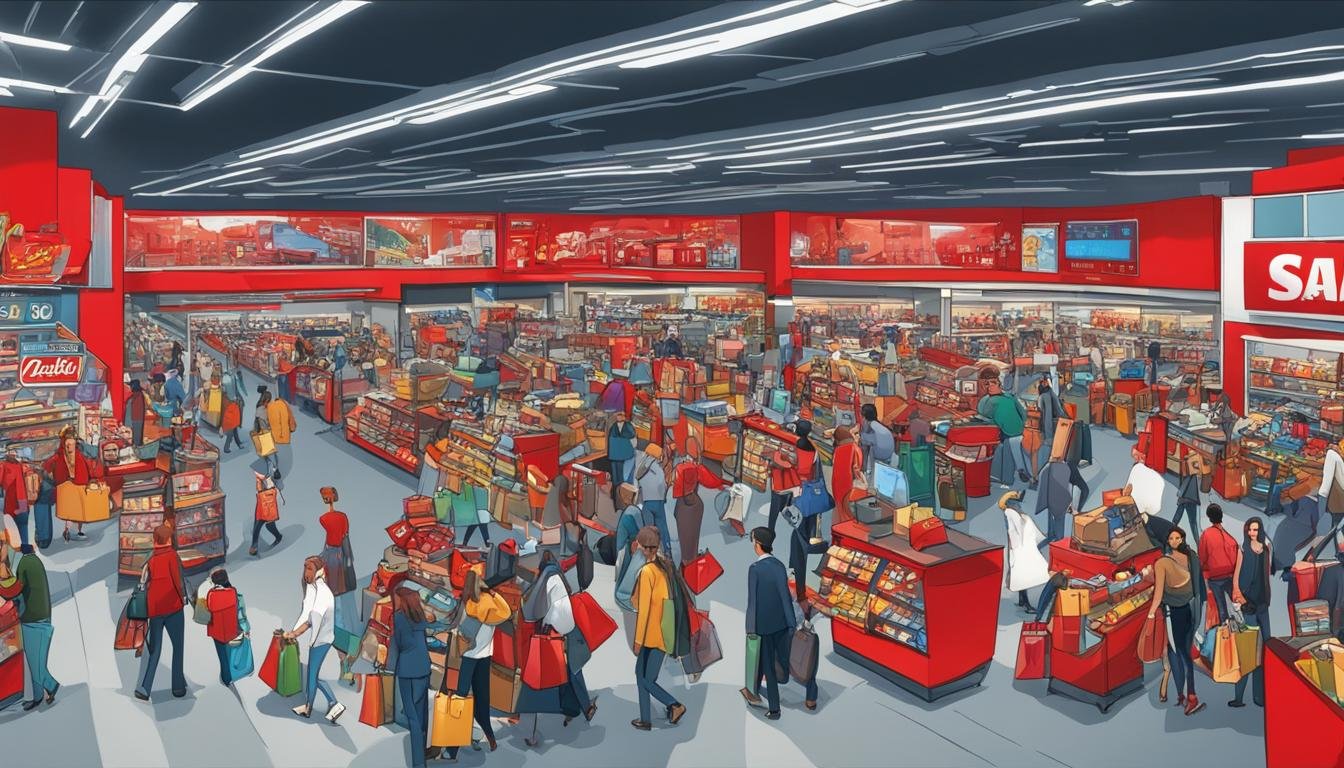Black Friday, a highly anticipated shopping extravaganza, is a phenomenon that captivates millions of people worldwide. But have you ever wondered why it is called Black Friday? Let’s explore the meaning behind this shopping frenzy and uncover the origins of this annual event.
Key Takeaways:
- Black Friday marks the beginning of the holiday shopping season, offering massive sales and discounts.
- The term “Black Friday” originated from bookkeeping practices and symbolizes a shift from loss to profit.
- It gained traction due to heavy traffic caused by eager shoppers in Philadelphia during the 1960s.
- Black Friday has evolved into a global shopping event, both in physical stores and online.
- Retailers strategically plan promotions, offers, and personalized messaging to lure holiday shoppers.
What is Black Friday?
Black Friday is the day after Thanksgiving, which falls on the fourth Thursday of November in the United States. It marks the unofficial beginning to the Christmas shopping season and has become one of the busiest retail days across America. On Black Friday, retailers offer huge discounts and promotions to attract customers, and many stores open their doors early in the morning to cater to eager shoppers. In recent years, online retailers have also joined in by offering special deals on their websites.
Black Friday has gained popularity due to the significant savings and discounts offered by retailers. It has become a tradition for many people to wake up early and line up outside stores in anticipation of snagging the best deals. The day is known for its chaotic and frenzied atmosphere as shoppers rush to grab limited-quantity items. Online shopping has also made Black Friday accessible to a wider audience, allowing people to shop from the comfort of their homes and take advantage of exclusive online deals.
For retailers, Black Friday is a crucial day for driving sales and boosting revenue. The massive influx of customers presents an opportunity to clear out excess inventory and attract new customers with irresistible discounts. While the day is synonymous with shopping, many people also view it as a social event, gathering with friends and family to hunt for bargains and make the most of the holiday spirit. Whether in physical stores or online, Black Friday offers an exciting shopping experience for consumers and a chance for retailers to capitalize on the holiday shopping frenzy.
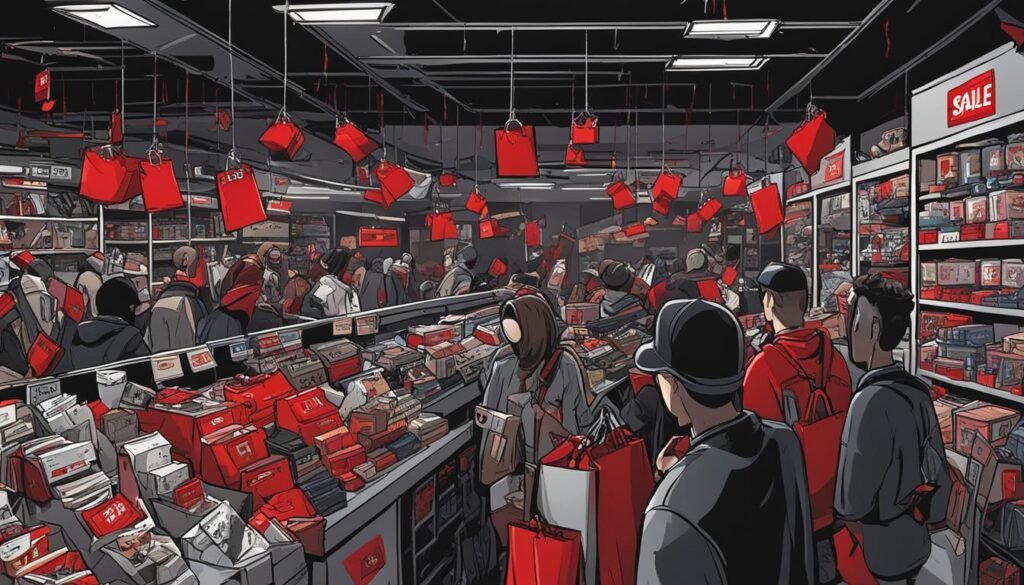
As Black Friday approaches, consumers eagerly await the opportunity to score incredible deals on a wide range of products. Whether you’re in the market for electronics, clothing, home appliances, or holiday gifts, Black Friday is the prime time to save money and get the most value for your purchases. So mark your calendars and get ready for the excitement of Black Friday!
Why is it called Black Friday?
Black Friday, the popular shopping event that follows Thanksgiving, has an intriguing origin behind its name. The term “Black Friday” was initially coined by police officers in Philadelphia during the 1960s. It referred to the heavy traffic and chaos caused by hordes of eager shoppers flooding into the city ahead of the Army-Navy football game, which is traditionally held on the same weekend. The term soon caught on and became widely used to describe this day of intense shopping and sales.
Another theory suggests that the name “Black Friday” stems from accounting practices. In bookkeeping, losses are often recorded in red ink, while profits are marked in black ink. It is believed that the term was adopted because the massive sales and profits generated by retailers on this day helped them transition from being “in the red” to being “in the black,” indicating a shift from loss to profit.
Furthermore, Black Friday has gained a reputation for workers calling out sick or choosing not to show up for work on this specific day. Many people take advantage of the long holiday weekend and make plans, resulting in lower workforce attendance. This phenomenon of absenteeism among workers also contributes to the name “Black Friday.”
The Origin of the Name “Black Friday”
The origin of the name “Black Friday” can be traced back to the bustling streets of Philadelphia during the 1960s. It can be attributed to the heavy traffic caused by enthusiastic shoppers flocking into the city for the Army-Navy football game. Over time, the term gained popularity and began to symbolize the massive sales and profits generated by retailers on this day. The name also holds connections to accounting practices, with the shift from “in the red” to “in the black” signifying a transition from loss to profit. Additionally, the phenomenon of workers taking time off on this day as part of their holiday plans adds another layer of meaning to the name “Black Friday.”
| Theories on the Origin of the Name “Black Friday” | Explanation |
|---|---|
| Heavy Traffic and Chaos | The name originated from the chaotic influx of shoppers in Philadelphia due to the Army-Navy football game held on the same weekend. |
| Accounting Practices | The term “Black Friday” was adopted to represent the shift from financial losses (recorded in red ink) to profits (recorded in black ink) experienced by retailers on this day. |
| Workers’ Absenteeism | The name also relates to workers calling out sick or opting not to work on Black Friday as part of their holiday plans. |
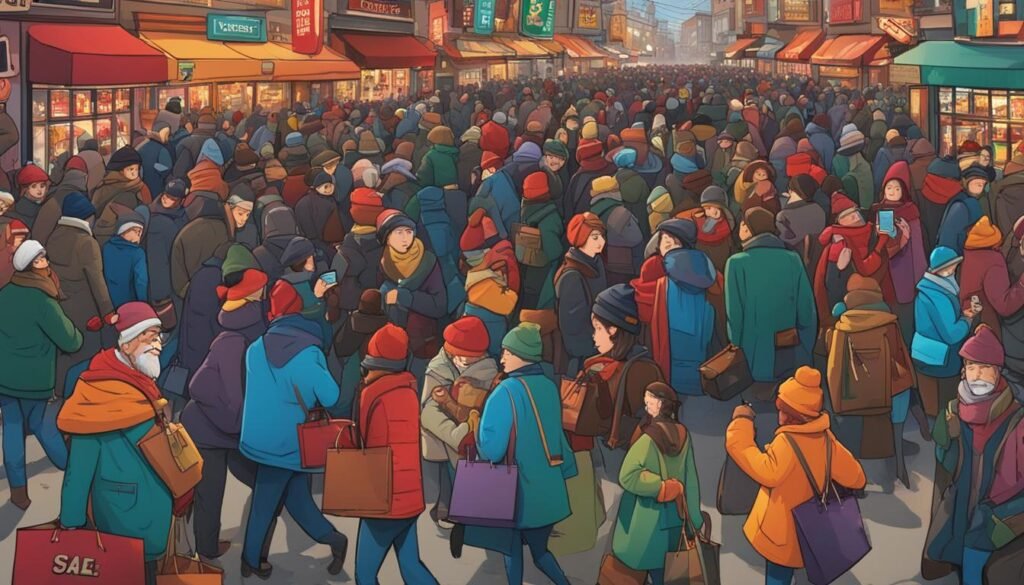
Origins and Meanings behind Black Friday
Black Friday, known for its massive sales and bustling shopping frenzy, has an intriguing history behind its name. Originally coined by Philadelphia police officers to describe the heavy traffic and chaos caused by shoppers flooding into the city for the Army-Navy football game, it soon became associated with the day of post-Thanksgiving shopping. The name “Black Friday” also holds connections to accounting practices, symbolizing the shift from financial losses to profits experienced by retailers on this day. Additionally, the phenomenon of workers taking time off and the anticipation of long holiday weekends add a unique dimension to the origin and meaning of Black Friday.
The History of Black Friday: Unraveling the Origins and Evolution
Black Friday has a fascinating history that traces back to American Thanksgiving traditions. It all began with people eagerly flocking to stores on the day after Thanksgiving in search of enticing deals. Over time, the term “Black Friday” came to specifically refer to the exceptional discounts offered on the Friday following Thanksgiving. What started as a local phenomenon in the United States has now evolved into a global shopping event, both in physical stores and online.
The origins of the name “Black Friday” can be attributed to the heavy traffic experienced by police officers in Philadelphia during the 1960s. The influx of shoppers coming into town ahead of an Army-Navy football game caused chaos on the streets. Some theories suggest that the term also relates to bookkeeping practices, with retailers recording losses in red ink and profits in black ink. Regardless of its exact origin, Black Friday has become deeply ingrained in our culture, with millions of shoppers actively participating in this annual tradition.
The evolution of Black Friday has seen retailers adapt to changing consumer behaviors and preferences. Online shopping has gained significant momentum in recent years, leading many retailers to offer special deals and promotions on their websites. The allure of Black Friday lies in the limited quantities of discounted products, generating a sense of urgency and excitement among shoppers. From smartphones to electronics and beauty products, Black Friday offers a wide range of coveted items at discounted prices.
To illustrate the historical significance and evolution of Black Friday, let’s take a look at the following table:
| Year | Key Events |
|---|---|
| 1960s | Black Friday term coined in Philadelphia |
| 1975 | The term “Black Friday” gains wider recognition |
| 2005 | Black Friday becomes the busiest shopping day of the year in the US |
| 2010 | Black Friday expands to online sales, with retailers offering deals on their websites |
| 2020 | Black Friday becomes an international shopping event, with retailers worldwide participating |
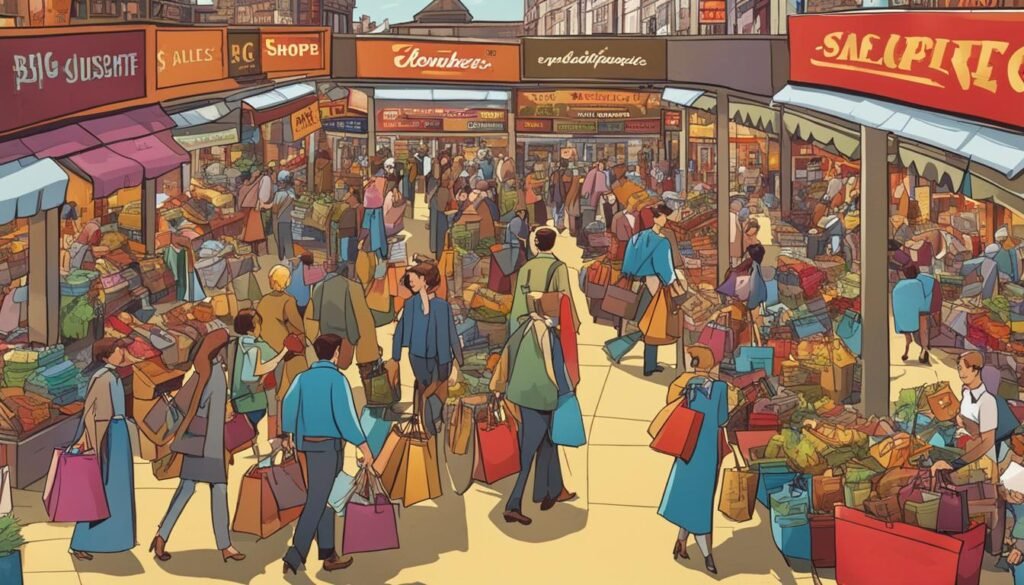
As the history of Black Friday shows, this shopping extravaganza has grown in significance and popularity. It has become a pivotal event for consumers seeking great deals and retailers looking to boost sales. The cultural impact and tradition associated with Black Friday make it a highly anticipated and exciting time of the year for shoppers around the world.
Retailers’ Plans This Year
As Black Friday approaches, retailers are gearing up for another record-breaking shopping frenzy. Major retailers such as Best Buy, Macy’s, H&M, as well as online companies like Shein and Temu, have already started promoting their upcoming sales. This year, shoppers can expect to find incredible deals with discounts of up to 30% off on selected products.
With the anticipation of high demand, retailers are taking necessary measures to prevent product shortages. This includes closely monitoring consumer preferences and adjusting their inventory accordingly. However, potential labor shortages and supply chain disruptions may pose challenges for some retailers.
To cater to the increasing popularity of online shopping, retailers are also offering special deals on their websites. This allows shoppers to conveniently browse and purchase their desired items from the comfort of their own homes.
Black Friday Sales Preview
| Retailer | Discount | Product Category |
|---|---|---|
| Best Buy | Up to 30% off | Electronics |
| Macy’s | Up to 40% off | Fashion and Home |
| H&M | Up to 50% off | Apparel |
| Shein | Up to 70% off | Fashion |
| Temu | Up to 20% off | Technology |
With these enticing offers, retailers are confident that shoppers will be enticed to take advantage of the discounts and make their purchases during the Black Friday sales extravaganza. Whether shopping in-store or online, consumers can expect to find great deals on a wide range of products.
So get ready to grab your favorite items at unbeatable prices this Black Friday!
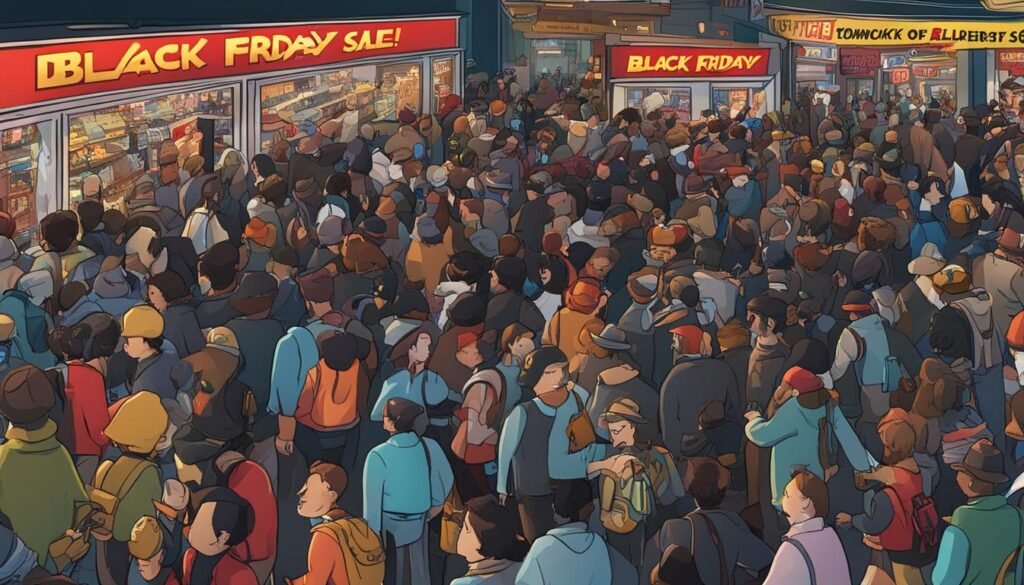
Are this year’s Black Friday crowds likely?
As Black Friday approaches, many shoppers are wondering what to expect in terms of crowds. The National Retail Federation (NRF) predicts that 130.7 million consumers will participate in Black Friday shopping this year. While this number is slightly lower than previous years, it still indicates a significant turnout.
It’s important to note that the retail landscape has shifted in recent years, with more consumers opting to shop online rather than in-store. This trend is expected to continue, with online sales projected to rise during the Black Friday period. Some retailers have even started offering online deals on Thanksgiving itself, enticing shoppers to stay home and take advantage of the discounts.
Last year, rainy weather in certain parts of the United States hampered in-store traffic on Black Friday. However, this year, weather conditions are not expected to be a significant factor. This means that retailers can anticipate a steady flow of customers, both in-store and online, ready to take advantage of the deals and promotions on offer.
Will shoppers find Black Friday deals this year?
Black Friday is renowned for its incredible discounts and savings, and this year is no different. Shoppers can expect a wide range of deals across various categories, from electronics and fashion to home goods and toys. Several large retailers, including Dollar General, Walmart, and Macy’s, are likely to have excess inventory that they need to clear, resulting in attractive discounts for customers.
Online shopping platforms are also expected to offer significant savings, especially on popular items like toys, athletic gear, and furniture. With the convenience of online shopping, shoppers can browse and compare prices from the comfort of their own homes and take advantage of exclusive online-only deals.
To ensure you don’t miss out on the best deals, it’s crucial to plan ahead and make a list of the items you’re looking to purchase. Researching prices and comparing them across different retailers can help you identify the most substantial savings. Additionally, signing up for newsletters or following your favorite stores on social media can provide you with exclusive access to early-bird deals and promotions.
| Retailer | Discount | Category |
|---|---|---|
| Dollar General | Up to 50% off | Household essentials |
| Walmart | Discounted prices on electronics | Electronics |
| Macy’s | Extra 20% off with code | Fashion and Home |
Whether you choose to shop in-store or online, make sure to set a budget and stick to it. It’s easy to get caught up in the excitement of Black Friday and overspend, so having a clear plan in mind will help you make the most of the savings without breaking the bank.
“Black Friday is the perfect opportunity to score great deals and save big on your holiday shopping.” – Retail Expert
How Retailers are Luring Holiday Shoppers with Black Friday Offers and Promotions
Black Friday is not just about the discounted prices and the thrill of the shopping experience. Retailers go the extra mile to entice holiday shoppers with a wide array of offers and promotions. From sales and early deals to personalized messaging, retailers are leaving no stone unturned to attract customers and maximize their Black Friday sales.
Retailers understand that consumers are looking for maximum value during the holiday season. That’s why they design their promotions to cater to different customer preferences. Whether it’s time-limited offers, countdown timers, or exclusive access, retailers employ various tactics to generate excitement and urgency among shoppers.
“This year’s must-have items for Black Friday include smartphones, electronics, and beauty products. Retailers are well aware of these popular categories and are offering attractive discounts to capture the attention of holiday shoppers,” says Sarah Thompson, a retail analyst at Retail Insights. “They understand that consumers are eager to find the best deals, especially after the financial strain caused by student loan payments and the cost of rent and necessities.”
In addition to the traditional in-store shopping experience, online retailers have also stepped up their game, offering a wide range of Black Friday deals on their websites. With the convenience of shopping from home, consumers can take advantage of these online promotions and find great deals without the hassle of navigating crowded stores.
So, whether you’re planning to brave the crowds or prefer the comfort of online shopping, this year’s Black Friday offers and promotions are sure to satisfy your holiday shopping needs. Get ready for exclusive discounts, personalized messaging, and unbeatable deals on the items you’ve been eyeing all year.
| Retailer | Offer | Discount |
|---|---|---|
| Best Buy | Early access deals | Up to 40% off |
| Macy’s | Flash sales | Extra 20% off |
| H&M | Online exclusives | Up to 50% off |
| Shein | Sitewide discounts | Up to 30% off |
| Temu | Free shipping | N/A |
Amounts Expected to be Spent by Shoppers
Black Friday is widely anticipated as a major shopping event, with consumers eager to find the best deals and savings. This year, the National Retail Federation predicts that holiday sales in the US will increase by 3% to 4% in November and December. Specifically, online spending on Black Friday is projected to increase by 5.7%, indicating a growing trend of shoppers opting for online shopping rather than venturing into physical stores.
In the UK, Black Friday online spending is expected to increase by 4.5%. These predictions indicate that millions of Americans and Britons plan to take advantage of the pre-holiday sales, indicating strong spending potential during the Black Friday period.
To put these numbers into perspective, billions of dollars are expected to be spent by shoppers during the Black Friday sales. This includes both in-store and online purchases, as retailers strive to attract customers with enticing discounts and promotions. The allure of limited quantities, social pressure, and the excitement of the deals contribute to the irresistible appeal of Black Friday, driving consumers to open their wallets and splurge on discounted items.
| Region | Predicted Increase in Holiday Sales | Predicted Increase in Black Friday Online Spending |
|---|---|---|
| United States | 3% – 4% | 5.7% |
| United Kingdom | N/A | 4.5% |
As these numbers demonstrate, Black Friday continues to be a significant driver of consumer spending, both in the US and internationally. Shoppers are expected to flock to stores and online platforms in search of the best discounts and savings, making Black Friday a highly anticipated event for retailers and consumers alike.
Conclusion
Black Friday has become an annual shopping extravaganza that signals the start of the holiday season. With its rich history and global appeal, retailers meticulously plan and prepare for this highly anticipated event by offering irresistible deals and promotions. The allure of limited quantities, social pressure, and the excitement of the discounts make Black Friday an irresistible shopping experience.
Shoppers are expected to spend billions of dollars during the Black Friday sales period, whether they choose to brave the crowds in-store or take advantage of the online deals. From electronics to beauty products, Black Friday offers something for everyone. The anticipation of savings and the thrill of finding the best deals make Black Friday a shopping event like no other.
So mark your calendars and get ready to embark on a shopping spree on Black Friday. Whether you’re hunting for the perfect gift or treating yourself to something special, this annual tradition promises incredible savings and a shopping experience you won’t forget. Don’t miss out on the excitement and savings that Black Friday has to offer!
FAQ
Why is it called Black Friday?
The term “Black Friday” originated from bookkeeping terminology used in Philadelphia in the 1960s, when accountants marked profits in black ink and losses in red ink. With so many people hitting stores on this day and generating huge sales numbers, Black Friday started symbolizing a shift from loss to profit.
What is Black Friday?
Black Friday is the day after Thanksgiving, which falls on the fourth Thursday of November in the United States. It marks the unofficial beginning to the Christmas shopping season and has become one of the busiest retail days across America. On Black Friday, retailers offer huge discounts and promotions to attract customers, both in physical stores and online.
Why is it called Black Friday?
The term “Black Friday” was initially used by police officers in Philadelphia during the 1960s, due to heavy traffic caused by eager shoppers flooding into town ahead of an Army-Navy football game held there annually on that same weekend. Some theories suggest that it also refers to accounting practices, with retailers recording losses in red ink and profits in black ink. Another theory suggests that workers often call out sick or choose not to show up for work on this specific day as part of their long holiday weekend plans.
What is the history of Black Friday?
Black Friday has its roots in American Thanksgiving traditions, with people flocking to stores on the day after Thanksgiving searching for deals. Over time, Black Friday has evolved into a global shopping event, both in physical stores and online. It has become a cultural phenomenon, with shoppers eagerly participating in the tradition year after year.
What are retailers’ plans for Black Friday this year?
Retailers such as Best Buy, Macy’s, H&M, and online companies like Shein and Temu have already started promoting discounts of up to 30% off on selected products. They are anticipating another record-breaking shopping frenzy across the US, Europe, and other regions. Retailers will gauge consumer demand and aim to prevent product shortages, especially considering potential labor shortages and supply chain disruptions.
Are this year’s Black Friday crowds likely?
While in-store traffic is expected to decrease slightly from the previous year, online sales continue to rise. Some American stores will remain closed on Thanksgiving and open early on Friday, while others are promoting online deals starting on Thanksgiving itself. Rainy weather, which hindered in-store traffic in some parts of the United States last year, is not predicted to be a significant factor this year.
Will shoppers find Black Friday deals this year?
Several large retailers may have excess inventory this year and may need to provide discounts to entice customers. Retailers such as Dollar General, Walmart, and Macy’s may have deals to clear their stock. Online savings on toys, athletic items, and furniture are anticipated. Overall, consumers are projected to spend billions of dollars during the Black Friday sales period, both in-store and online.
How are retailers luring holiday shoppers with their offerings?
Retailers are relying on sales, early deals, and personalized messaging to attract holiday shoppers. With the return of student loan payments and the cost of rent and necessities, consumers are looking for maximum value and promotional activities. Retailers offer personalized messaging based on customer preferences and utilize tactics like time-limited offers, countdown timers, and exclusive access to generate excitement and urgency. The must-have items for Black Friday this year include smartphones, electronics, and beauty products.
How much are shoppers expected to spend this Black Friday?
The National Retail Federation predicts that 130.7 million consumers will shop on Black Friday this year. Retailers are projecting holiday sales in the US to increase by 3% to 4% in November and December, while Black Friday online spending is projected to increase by 5.7%. In the UK, Black Friday online spending is expected to increase by 4.5%. A survey suggests that millions of Americans plan to shop during the pre-holiday sales, indicating strong spending potential during Black Friday and Cyber Monday.
Conclusion
Black Friday has become a significant annual shopping event that marks the beginning of the holiday shopping season. It has a rich history and has evolved into a global phenomenon. Retailers plan and prepare for Black Friday each year, offering enticing deals and promotions to attract shoppers. The allure of limited quantities, social pressure, and the excitement of the deals contribute to the irresistible appeal of Black Friday. Shoppers are expected to spend billions of dollars, both in stores and online, during the Black Friday sales period.
Source Links
- https://www.wionews.com/business-economy/unveiling-black-friday-must-have-deals-in-high-demand-ahead-of-shopping-frenzy-661035
- https://msmdurham.com/what-is-black-friday-means-unveiling-the-secrets-behind-this-shopping-extravaganza/
- https://msmdurham.com/what-does-black-friday-mean-unveiling-the-secrets-behind-this-shopping-extravaganza/
